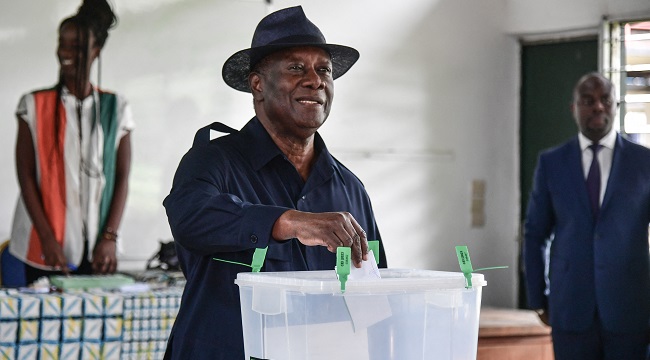Côte d’Ivoire President Alassane Ouattara on Tuesday confirmed he will seek a fourth term in office, igniting political tension as opposition parties denounce the move as unconstitutional and a fresh threat to Ivorian democracy.
Although Ouattara had earlier been nominated by his ruling Rally of Houphouetists for Democracy and Peace (RHDP), this marks his formal acceptance to run in the 2025 presidential election.
“I am a candidate because the constitution of our country allows me to run for another term and my health permits it,” Ouattara said, citing the country’s security, economic, and monetary challenges as reasons for his continued leadership.
His announcement comes amid widespread criticism from opposition parties, whose key candidates including former President Laurent Gbagbo, ex-Prime Minister Guillaume Soro, and Democratic Party leader Tidjane Thiam have been barred from running due to convictions or contested nationality issues.
“The announcement made today by Mr. Ouattara constitutes a violation of our constitution and a new attack on democracy,” said Thiam in a statement.
A United Nations human rights committee has reportedly called on Ivorian authorities to allow Thiam to exercise his political rights, according to his lawyer, Mathias Chichportich.
Meanwhile, Damana Pickass, a senior figure in Gbagbo’s African People’s Party (PPACI), labelled Ouattara’s fourth-term bid “unconstitutional”. Presidential candidate Pascal Affi N’Guessan of the Ivorian Popular Front (FPI) also slammed it as “as illegal as his third”.
Ouattara’s third term in 2020 had already sparked fierce controversy and deadly unrest, after a 2016 constitutional change reset term limits, allowing him to claim eligibility once more. The opposition boycotted that election, and Ouattara secured victory in a landslide amid protests that killed over 85 people.
Despite the controversy, Ouattara is widely credited with bringing relative stability to the country following civil war, although critics accuse him of consolidating power and using courts to suppress opposition allegations the government denies, insisting the judiciary remains independent.
Background on Ouattara’s Political Career
A former IMF economist and head of the West African Central Bank (BCEAO), Ouattara entered politics under Côte d’Ivoire’s founding leader Félix Houphouët-Boigny, later becoming embroiled in a power struggle following the president’s death in 1993.
Barred from the 1995 and 2000 elections due to laws questioning his nationality, Ouattara was a divisive figure throughout the 2002 civil war, which split the country into a rebel-held north and government-controlled south.
He eventually contested the 2010 election, defeating incumbent Gbagbo — who refused to concede, sparking post-election violence that left over 3,000 people dead. Ouattara assumed office in 2011 after Gbagbo’s arrest and eventual transfer to the International Criminal Court.
Although Gbagbo was acquitted at The Hague, a domestic conviction still bars him from contesting elections.

